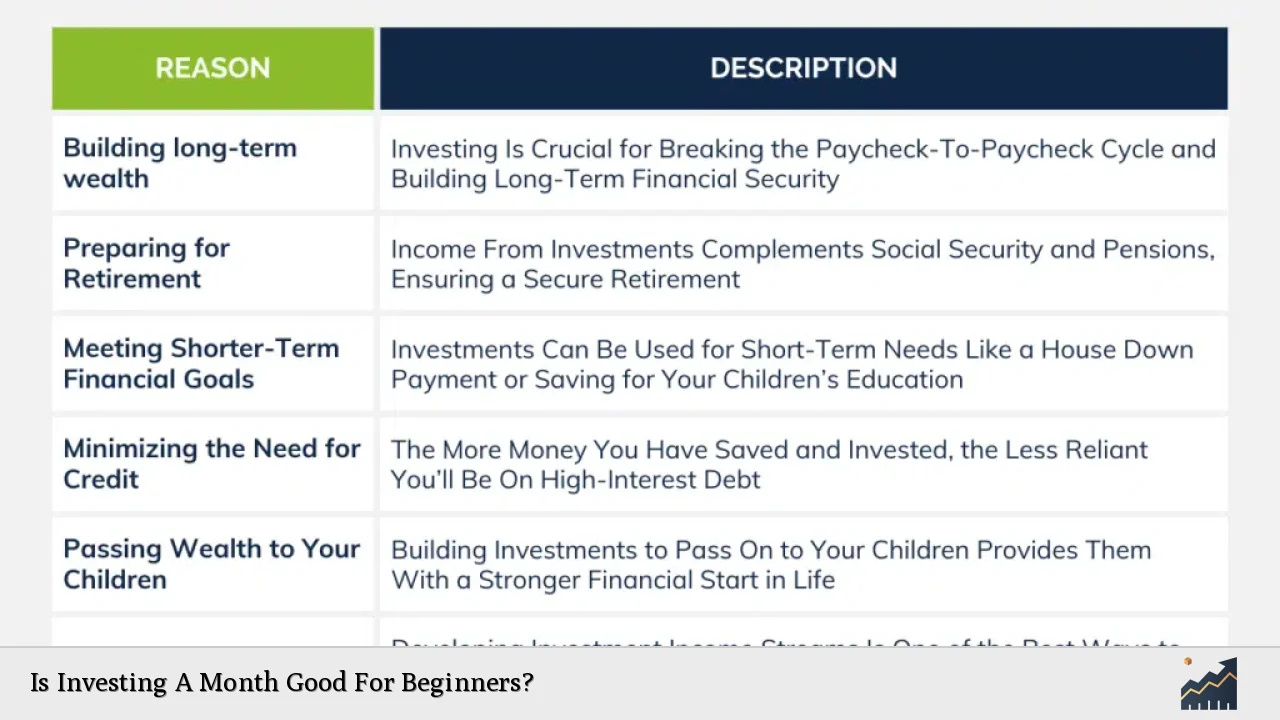Investing can seem daunting, especially for beginners. Many individuals wonder if dedicating just a month to investing is sufficient for them to start building wealth. The short answer is yes; even a month can be a good starting point for beginners. However, the effectiveness of this short-term commitment largely depends on how one approaches the investment process.
In this article, we will explore the fundamentals of investing for beginners, why starting with a month of investment can be beneficial, and practical strategies to maximize returns even in such a brief timeframe. We will also discuss common pitfalls to avoid and provide answers to frequently asked questions about investing.
| Aspect | Details |
|---|---|
| Time Frame | One month can be a good start for beginners. |
| Investment Type | Consider low-risk options like ETFs or blue-chip stocks. |
Understanding the Basics of Investing
Investing involves allocating resources, usually money, with the expectation of generating an income or profit. For beginners, understanding the basic types of investments is crucial.
- Stocks: Shares in a company that can appreciate in value over time.
- Bonds: Loans made to corporations or governments that pay interest over time.
- Mutual Funds and ETFs: Pooled investments that allow you to buy a collection of stocks or bonds.
- Real Estate: Property investments that can yield rental income and appreciation.
Each type of investment carries its own level of risk and potential return. Stocks tend to offer higher returns but come with higher volatility, while bonds are generally safer but provide lower returns.
Investing for just a month can serve as an introduction to these concepts without overwhelming new investors. It allows them to get their feet wet and understand market dynamics without committing significant resources.
Benefits of Starting to Invest Now
Starting your investment journey now, even for just a month, has several advantages:
- Time in the Market: The earlier you start investing, the more time your money has to grow through compounding. Even a single month can be the beginning of a long-term investment strategy.
- Learning Experience: Investing for a month can provide valuable insights into how markets operate. Beginners can learn about market fluctuations, how to read stock charts, and the importance of diversification.
- Building Habits: Committing to invest regularly, even if it’s just for one month, helps establish good financial habits. It encourages discipline in saving and investing.
- Access to Tools: Many platforms now offer user-friendly interfaces and educational resources tailored for beginners. This makes it easier than ever to start investing with minimal knowledge.
Strategies for Beginners Investing in One Month
For those considering investing over just one month, here are some effective strategies:
Start with Low-Risk Investments
Beginning with low-risk options like Exchange-Traded Funds (ETFs) or blue-chip stocks is advisable. These investments typically have less volatility compared to smaller companies or speculative stocks.
Use Robo-Advisors
Robo-advisors are automated platforms that create and manage your investment portfolio based on your risk tolerance and goals. They are perfect for beginners who may not have the time or expertise to manage their investments actively.
Set Clear Goals
Before investing, define what you want to achieve within that month. Whether it’s testing the waters or aiming for specific returns, having clear goals helps maintain focus and direction.
Monitor Your Investments
Even though one month is short, monitoring your investments is crucial. This allows you to understand market trends and make informed decisions about whether to hold or sell your assets.
Diversify Your Portfolio
Diversification reduces risk by spreading investments across various assets. Even within a single month, consider allocating funds across different sectors or asset classes.
Common Mistakes Beginners Make When Investing
While investing can be rewarding, beginners often fall into certain traps:
- Emotional Trading: Making decisions based on fear or greed can lead to poor outcomes. Stick to your strategy rather than reacting impulsively to market changes.
- Lack of Research: Failing to understand where you’re putting your money can result in losses. Always conduct thorough research before making any investment decisions.
- Timing the Market: Many new investors try to predict market movements, which is often futile. Instead, focus on long-term growth rather than short-term fluctuations.
- Neglecting Fees: Be aware of any fees associated with buying or selling investments. High fees can erode your returns significantly over time.
FAQs About Investing A Month
- Is it worth investing for just one month?
Yes, it can provide valuable experience and help establish good financial habits. - What should I invest in as a beginner?
Consider starting with low-risk options like ETFs or blue-chip stocks. - Can I lose money by investing for a short period?
Yes, all investments carry risk; however, diversifying can help mitigate potential losses. - How do I choose an investment platform?
Look for user-friendly platforms with low fees and educational resources. - Should I use a robo-advisor?
Robo-advisors are great for beginners as they manage investments based on your preferences.
Conclusion
Investing for just one month is not only possible but can also be an excellent way for beginners to dip their toes into the world of finance. By understanding the basics of investing, utilizing available tools like robo-advisors, and following sound strategies such as diversification and emotional discipline, new investors can make informed decisions that set them up for future success.
While one month may not seem like enough time to see significant returns, it lays the groundwork for a more extensive investment journey ahead. Remember that building wealth through investing takes time and patience; starting now—no matter how brief—can lead you toward achieving your financial goals in the long run.

